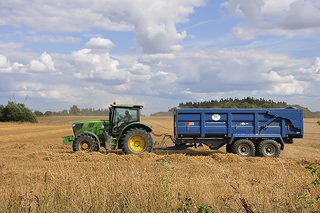Glyphosate Hurts Gut Probiotics, Linked to Gluten Sensitivity
Multiple studies have found that food sensitivities aren’t necessarily the results of sensitivities to the food itself: Sometimes there are additives that produce the sensitivity.
There is now good evidence that in fact glyphosate – or more specifically the herbicide RoundUp® – may be a contributing factor for wheat sensitivities and even allergies including celiac disease.
The implication comes in the form of what is referred to by many wheat farmers as desiccation. This is the spraying of the herbicide RoundUp® onto a commercial crop of wheat just prior to harvest. According to Monsanto and many farm advisors, this kills and dries out the wheat plant, which stimulates heavier wheat berries in order to yield a greater harvest.
It also makes the harvest easier, since the wheat plants are dried out – or better, killed – after being sprayed with the herbicide.
In this article
Glyphosate increasingly used on wheat
According to data provided by the USDA, the application of glyphosate onto wheat crops in the U.S. has significantly increased over the past few decades. In 1998, 91% of spring wheat, 88% of durum wheat and 47% of winter wheat was sprayed with glyphosate herbicides. In 2012, the percentages were 97%, 99% and 61%, respectively.
This means that most of the conventionally grown U.S. wheat is sprayed with glyphosate herbicide at some point. This doesn’t mean that all this percentage underwent desiccation prior to harvest, however.
But the evidence indicates that desiccation is significantly used by U.S. wheat farmers, and farmers of many other conventionally-grown crops.
And desiccation will produce seed abnormalities, making it difficult for the farmers to replant the seed harvested with this method. According to a release from Steve Sebesta, the Deputy Commissioner North Dakota State Seed Department regarding planting wheat:
“Don’t use grain harvested from fields treated with glyphosate as a harvest aid for seed. It’s grain, not seed.”
Mr. Sebesta indicated that testing showed 98% of desiccated seed was not productive. The first question this brings up is why would such a practice be horrible for planting seed yet be okay for humans to eat? The concept is absurd at the least.
The fact is, glyphosate and the other chemicals including surfactants utilized in RoundUp® are implicated in inhibiting gut bacteria from producing enzymes that are critical to our health. And by inhibiting these bacteria, we are essentially setting up the means for intestinal abnormalities.
Research has confirmed that glyphosate specifically reduces gut bacteria populations. Among other studies, research from Germany’s Leipzig University (Shehata et al. 2013) found that glyphosate significantly reduces probiotic bacteria including Enterococcus species, Bifidobacterium species and Lactobacillus species, while promoting the growth of pathogenic bacteria such as Salmonella species and Clostridium species.
Glyphosate interferes with crucial metabolic pathway
The reason for this? Glyphosate interferes with the shikimic acid pathway, a crucial part of cell metabolism among plants and bacteria. In other words, the same destructive effects that glyphosate has upon plants also produces a die off of probiotic gut bacteria. This leaves the less vulnerable pathogenic bacteria such as Clostridium difficile to thrive in the gut, producing chaos within the digestive system along with an inability to break down wheat proteins.
That’s because it is our gut probiotics that produce the enzymes that break down gluten proteins.
Celiac disease parallels glyphosate use
Furthermore, a study by MIT scientists (Samsel and Seneff 2013), reveals that the rise in celiac disease incidence in the U.S. is directly proportionate with increases in glyphosate spraying to wheat crops since 1990.
And because celiac disease is linked with decreased populations of probiotic gut bacteria such as lactobacilli, bifidobacteria and enterococci, we can thus associate farmers’ increased use of glyphosate – not only among wheat crops but also many other crops – with the dramatic increase of celiac disease among Western populations including the U.S. and the U.K.
Note that glyphosate is not sprayed onto organic food crops.
The organic solution
While the above excerpt from my book on Gluten points provide an issue related to wheat sensitivities, there is a larger issue with respect to many other food sensitivities. As I show conclusive proof in the book, our probiotic bacteria produce the enzymes that break down not only gluten, but many other important proteins.
When these proteins are not properly broken down – thus being macromolecules – the body can become sensitive to them as the immune system marks them as foreign. Learn more about this process in my food allergy book.
The importance of eating organic foods – including wheat products – is critical here. It may not always be possible to eat organic foods when we are traveling or eating out, but choosing organic foods when we shop and cook at home will significantly decrease our exposure to glyphosates.
And if enough of us do this, we can actually change things, because there will be less demand for glyphosate-sprayed crops and more demand for organic crops. This will encourage more farmers to convert their crops to organic.
Yes, we can change the world with our wallet.
REFERENCES:
With the exception of the commentary, the above article is an excerpt from The Gluten Cure by Case Adams. References are available from the book:
















